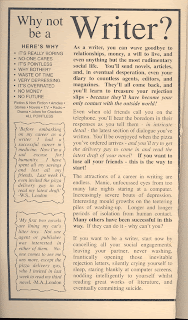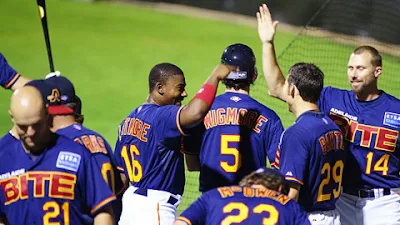For example, what are the purposes of this blog?
A way to answer that might be to ask: what might be the purpose of any blog?
- Efficiency. If the geography your 'social network' extends beyond people you see everyday, it's simpler to let your friends, family, and colleagues know what's on your mind through a regular post than to write 100 emails or air mail letters. Who, other than the progeny-free, the unemployed, or the fully retired has that kind of time on their hands?
- Development of thought. As the 140-character tweet and/or the 160 character sms and/or the (?) character Facebook status update have conspired to lower the bar to new depths of shallow, blogging allows the longitude and latitude to opine, to ramble, to meander to the extent that allows the reader to (in the words of Kurt Vonnegut, literary icon and Unitarian) 'meditate with the mind of another'. The cryptic tweet or update is, by contrast, a come-one line in a noisy bar; it is a hook without a fish dinner in mind. The blog is dinner, dancing, love-making, and pillow talk in the wee hours. You can get to know people better.
- Interactivity and community building/maintenance. Though most of my readers' comment on this blog's Facebook link, the blog provides the opportunity for further development through ready discussion--a kind of asynchronous conversation. Emails can do that too, but see #1 above. Plus, readers can talk to each other and develop their own conversation streams and interactions. Emails can't do that.
- Rough-drafting and peer review. If you write for a living, as I now do, you write and edit and re-write and maybe show things to your partner or a friend for feedback. But everyone knows that they're going to massage the truth a bit for the benefit of the relationship. This can take many forms--pretending to be interested, turning a blind eye to your hobby-horses or verbal quirks, etc. They're in the echo-chamber of your ego, more or less, and will probably not attempt to scupper the project. So, as with school essays, your mom is not your best critic. Admittedly, the blog is "narrow-cast" (vs. broadcast) to the limits of your social network, but there are varying levels of intimacy in that sphere. Hence, some might point out things that may seem permissible or 'hidden in plain sight' to those closer to you. Further, there's always the chance that those you've never even met may read and offer an even more remote perspective. So, a blog can be a way of airing and developing work you're writing for another forum--in my case, papers, addresses and print articles.
- Freeing speech. Because of the low entry requirements (a computer, a broad-band connection, and rudimentary computer literacy), anyone can say anything they like. There are no gate-keepers to bar access to an audience or edit what you say. Because there is no hierarchical organisation validating and monetizing the blog, any audience you get is one you've built through social networks, through tag words that people randomly Google-search, or just through luck and word-of-mouth. Which is why you're reading this for free. And, while I'm not talking to very many people, no one can shut me up.
 |
| I can think of, oh, a thousand reasons.... |
So, given those advantages, why would I want to keep THIS blog?
My friend Jane says blogging is verbal wankery, and I can see her point, though there's nothing particularly wrong with pleasing oneself. As Woody Allen said, it's sex with someone you love.
So is it just a self-absorbed exercise in a fruitless dissemination of words into the yawning world wide maelstrom of blather, a drip in the cyber ocean?
Near the beautiful climax of the Frank Capra film "It's a Wonderful Life", the unlikely angel Clarence tells the mind-blown George Bailey, overlooking the desolation of his home-town as it might be had he not lived: "Strange, isn't it? Each man's life touches so many other lives."
 |
| No man is alone, if he has readers... |
We never know the good we may do. We never know what seeds we scatter may find the odd broken patch of vulnerable soil, take root, and transform to flourish in the sun, somewhere.
IF you've read this far, thank you.



















